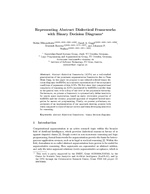Inproceedings3332: Unterschied zwischen den Versionen
Aus International Center for Computational Logic
Stefan Ellmauthaler (Diskussion | Beiträge) Keine Bearbeitungszusammenfassung |
Stefan Ellmauthaler (Diskussion | Beiträge) Keine Bearbeitungszusammenfassung |
||
| Zeile 10: | Zeile 10: | ||
|Year=2022 | |Year=2022 | ||
|Booktitle=Proceedings of the 16th International Conference on Logic Programming and Non-monotonic Reasoning (LPNMR 2022) | |Booktitle=Proceedings of the 16th International Conference on Logic Programming and Non-monotonic Reasoning (LPNMR 2022) | ||
|Editor=G. Gottlob, D Inclezan, M. Maratea | |||
|Series=Lecture Notes in Computer Science | |||
|Volume=13416 | |||
}} | }} | ||
{{Publikation Tool | {{Publikation Tool | ||
| Zeile 17: | Zeile 20: | ||
|Abstract=Abstract dialectical frameworks (ADFs) are a well-studied generalisation of the prominent argumentation frameworks due to Phan Minh Dung. In this paper we propose to use reduced ordered binary decision diagrams (roBDDs) as a suitable representation of the acceptance conditions of arguments within ADFs. We first show that computational complexity of reasoning on ADFs represented by roBDDs is milder than in the general case, with a drop of one level in the polynomial hierarchy. Furthermore, we present a framework to systematically define heuristics | |Abstract=Abstract dialectical frameworks (ADFs) are a well-studied generalisation of the prominent argumentation frameworks due to Phan Minh Dung. In this paper we propose to use reduced ordered binary decision diagrams (roBDDs) as a suitable representation of the acceptance conditions of arguments within ADFs. We first show that computational complexity of reasoning on ADFs represented by roBDDs is milder than in the general case, with a drop of one level in the polynomial hierarchy. Furthermore, we present a framework to systematically define heuristics | ||
for search space exploitation, based on easily retrievable properties of roBDDs and the recently proposed approach of weighted faceted navigation for answer set programming. Finally, we present preliminary experiments of an implementation of our approach showing promise both when compared to state-of-the-art solvers and when developing heuristics for reasoning. | for search space exploitation, based on easily retrievable properties of roBDDs and the recently proposed approach of weighted faceted navigation for answer set programming. Finally, we present preliminary experiments of an implementation of our approach showing promise both when compared to state-of-the-art solvers and when developing heuristics for reasoning. | ||
|ISBN=978-3-031-15707-3 | |||
|Download=cr lpnmr.pdf | |Download=cr lpnmr.pdf | ||
|Link=https://link.springer.com/chapter/10.1007/978-3-031-15707-3_14 | |||
|DOI Name=10.1007/978-3-031-15707-3_14 | |||
|Projekt=CPEC, NAVAS, ScaDS.AI | |Projekt=CPEC, NAVAS, ScaDS.AI | ||
|Forschungsgruppe=Logische Programmierung und Argumentation, Wissensbasierte Systeme | |Forschungsgruppe=Logische Programmierung und Argumentation, Wissensbasierte Systeme | ||
}} | }} | ||
Version vom 26. August 2022, 15:14 Uhr
Representing Abstract Dialectical Frameworks with Binary Decision Diagrams
Stefan EllmauthalerStefan Ellmauthaler, Sarah Alice GagglSarah Alice Gaggl, Dominik RusovacDominik Rusovac, Johannes P. WallnerJohannes P. Wallner
Stefan Ellmauthaler, Sarah Alice Gaggl, Dominik Rusovac, Johannes P. Wallner
Representing Abstract Dialectical Frameworks with Binary Decision Diagrams
In G. Gottlob, D Inclezan, M. Maratea, eds., Proceedings of the 16th International Conference on Logic Programming and Non-monotonic Reasoning (LPNMR 2022), volume 13416 of Lecture Notes in Computer Science, to appear
Representing Abstract Dialectical Frameworks with Binary Decision Diagrams
In G. Gottlob, D Inclezan, M. Maratea, eds., Proceedings of the 16th International Conference on Logic Programming and Non-monotonic Reasoning (LPNMR 2022), volume 13416 of Lecture Notes in Computer Science, to appear
- KurzfassungAbstract
Abstract dialectical frameworks (ADFs) are a well-studied generalisation of the prominent argumentation frameworks due to Phan Minh Dung. In this paper we propose to use reduced ordered binary decision diagrams (roBDDs) as a suitable representation of the acceptance conditions of arguments within ADFs. We first show that computational complexity of reasoning on ADFs represented by roBDDs is milder than in the general case, with a drop of one level in the polynomial hierarchy. Furthermore, we present a framework to systematically define heuristics for search space exploitation, based on easily retrievable properties of roBDDs and the recently proposed approach of weighted faceted navigation for answer set programming. Finally, we present preliminary experiments of an implementation of our approach showing promise both when compared to state-of-the-art solvers and when developing heuristics for reasoning. - Weitere Informationen unter:Further Information: Link
- Projekt:Project: CPEC, NAVAS, ScaDS.AI
- Verknüpfte Tools:Related Tools: adf-bdd
- Forschungsgruppe:Research Group: Logische Programmierung und ArgumentationLogic Programming and Argumentation, Wissensbasierte SystemeKnowledge-Based Systems
@inproceedings{EGRW2022,
author = {Stefan Ellmauthaler and Sarah Alice Gaggl and Dominik Rusovac and
Johannes P. Wallner},
title = {Representing Abstract Dialectical Frameworks with Binary Decision
Diagrams},
editor = {G. Gottlob and D Inclezan and M. Maratea},
booktitle = {Proceedings of the 16th International Conference on Logic
Programming and Non-monotonic Reasoning (LPNMR 2022)},
series = {Lecture Notes in Computer Science},
volume = {13416},
year = {2022},
doi = {10.1007/978-3-031-15707-3_14}
}
